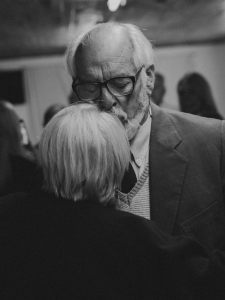
A broken relationship can come about easier than we think. Whether we intend to or not, we often do hurt the people that are closest to us, and those we love most. Many things can cause friction and hurt in a relationship, such as an insensitive comment, not paying as much attention as we ought to, not being as supportive as others expect, etc.
Your spouse has just made a dinner that they clearly put a lot of effort into. They spent hours shopping for your favorite food, then preparing it. Unbeknownst to them, you were caught at the last minute by a work emergency, and that delayed your arrival at home. Or maybe your car broke down and you had no way to let them know.
Now, whether you meant it or not, you get home late and the meal that was lovingly prepared for you is now cold, and the moment feels lost. Or if someone gets you a gift, and your response is less enthusiastic than they hoped, that can hurt the gift-giver, and if that hurt isn’t addressed, it can fester and develop into something far bigger than the initial slight. Seeking guidance from a counselor, at Agoura Christian Counseling, can help navigate these types of situations and facilitate healthy communication to prevent unresolved feelings from escalating.
Tips for Mending a Broken Relationship
The gap between expectations and reality, and the gulf that can exist between our intentions and our actions create a breeding ground of pain, disappointment, and relationship wreckage. What do you do if you have a damaged or broken relationship? If the relationship matters to you, knowing what happened and seeking to remedy things with them is probably the best thing you can do.
Exercise empathy
Sometimes, we just don’t get why the other person is mad. After all, in the example above it’s no one’s fault that the car broke down and there was no way to communicate that fact. So why are they so mad at me? What did I do? Or in the example of the gift that had a lot of thought put into it, surely, it’s not my fault that my reaction didn’t meet their expectations, is it?
The first thing to do when someone close to you is angry with you and your relationship has been damaged is to put yourself in the other person’s shoes. This is probably the most basic definition of what empathy is – simply putting yourself in the other person’s place and imagining what they could be going through. While we may exercise empathy in daily life, in some situations we might not feel or exercise empathy.

This can happen, for instance, when our desire for self-preservation overwhelms thinking about what the other person is feeling. We don’t like being wrong, and so that can generate a blind spot that prevents us from seeing how we may have contributed to the situation.
Friend, we all have something within us that sometimes sinfully seeks to protect us from legitimate criticism. Our feelings of self-righteousness try, and they can succeed in smothering that small voice of conscience that would have us do right by others.
If you’re finding it hard to imagine why someone might be mad at you, take a second to think through your life, and think about a situation that possibly mirrors the situation you’re in now. What happened when you gave someone a gift, and maybe they weren’t as excited about it as you’d hoped they would be? How did that make you feel?
If you put a huge amount of effort into something, and the person you made the effort for doesn’t get to enjoy it for one reason or another, how did you feel? Maybe you got angry, and even if you may have felt angry at the situation, perhaps some of that anger was displaced and rested on the person, even though you knew it wasn’t their fault.
It happens even to the best of us. This little exercise is helpful in that it can put you in a place where you can see, or rather feel the perspective of the other person you may have hurt, even if it was inadvertent. The first step to restoring a damaged or broken relationship is to exercise empathy.
Apologize
When pain has been inflicted, one way to return order to the universe is to apologize for the hurt caused. Being able to apologize goes a long way in repairing a damaged or broken relationship.
Of course, forgiveness isn’t contingent upon an apology, but you can be sure that it’s easier for a person to forgive when they know that the other person can see what they did wrong, and they understand the impact of what they did and how it landed with the other person.

For an apology to be effective, it needs a couple of things. Firstly, it needs to be sincere. An insincere apology feels like a thinly veiled insult, and they leave things worse than at first. Have you ever been given an insincere apology, one where you can tell the other person doesn’t mean a word they’re saying but they’re just doing what they must to move past an awkward situation?
It likely makes you angrier and feel injured twice over. The way to mean what you say in your apology is to empathize. When you can feel what they feel, you’re in a better place to mean exactly what you say when you express your sorrow and remorse at what happened.
Secondly, an apology needs to take accountability. An apology is not the time to rattle off excuses, however legitimate, for what happened. An apology should simply name and own what was done wrong. The apology should be clear. Some apologies leave you wondering, “What exactly do they think they did wrong, and is it what I think they did wrong?”
In the example of the gift, the apology might be, “Thank you for the gift you gave me. I know you put a lot of effort into it, and I’m sorry that my response was considerably less enthusiastic than it should have been for such a thoughtful gift.”
An apology is not the time to say, “But you know I always say don’t get me anything,” or “I had stuff on my mind and wasn’t focused on your gift.” All of that may be true, and there is a place for having that conversation, but it’s not in your apology. 
Lastly, an effective apology expresses remorse for what you’ve done or for what happened, and it contains a commitment to do things differently in the future. Showing remorse for your part in the situation indicates to the other person that you take the situation seriously, and that your behavior registers as wrong or inappropriate.
Now they know that you know that what happened wasn’t cool. In addition to acknowledging that what happened wasn’t okay, an effective apology also lays out clearly what you’ll do differently in the future. Not only does this help the other person with the assurance that you want to change, but it also provides you both with a definitive point to refer to if accountability is needed in the future.
Demonstrate changed behavior
The best accompaniment to an apology is changed behavior. That shows that you’ve taken your past behavior into account and have made necessary corrections. In many cases, an effective apology that accepts accountability, shows remorse, and promises changed behavior will help a broken relationship to heal.
Sometimes, however, the damage in the broken relationship is harder to repair, but an apology should still be given, not because it will “fix” things, but because it’s the right thing to do, whether or not it restores the relationship. In a situation where the damage to the relationship is extensive, it may take more than an apology to get things back the way they were.
Time can work to heal the wounds, but in some cases, broken things remain broken despite your best efforts. That’s regrettable and painful, but it’s okay. Continue to do what is right – don’t slander the person; instead, pray for the person and the relationship, and remain accountable for your words and actions before the Lord.
If you’re struggling with a broken relationship, seek the wisdom of a therapist at Agoura Christian Counseling to help you not only process what is going on in your relationships but assist you in developing tools to successfully navigate those relationships.
Sometimes, our relationships issues are rooted in anger, or difficulties developing an intimate connection with others. Maybe you need to learn how to forgive others, or how to let your words match your intentions, and finding that help will allow your relationships to flourish.
“Smiling Couple”, Courtesy of Andre Tan, Unsplash.com, CC0 License; “Seasoned Couple”, Courtesy of Gaspar Zaldo, Unsplash.com, CC0 License; “Couple and Dog”, Courtesy of Vladislav Filippov, Unsplash.com, CC0 License; “Pensive Couple”, Courtesy of Andres Molina, Unsplash.com, CC0 License
-
Shirley Kauffman: Author
As a Licensed Marriage and Family Therapist, I provide faith-based counseling for individuals, couples, and families facing a wide range of issues including anxiety, depression, marriage problems, divorce, and other family issues. With God’s help, I’...
-
Kate Motaung: Curator
Kate Motaung is the Senior Writer, Editor, and Content Manager for a multi-state company. She is the author of several books including Letters to Grief, 101 Prayers for Comfort in Difficult Times, and A Place to Land: A Story of Longing and Belonging...
DISCLAIMER: THIS ARTICLE DOES NOT PROVIDE MEDICAL ADVICE
Articles are intended for informational purposes only and do not constitute medical advice; the content is not intended to be a substitute for professional medical advice, diagnosis, or treatment. All opinions expressed by authors and quoted sources are their own and do not necessarily reflect the opinions of the editors, publishers or editorial boards of Stone Oak Christian Counseling. This website does not recommend or endorse any specific tests, physicians, products, procedures, opinions, or other information that may be mentioned on the Site. Reliance on any information provided by this website is solely at your own risk.






